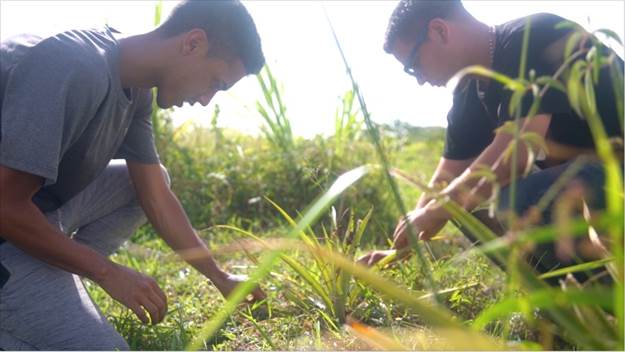Minor in Literacy for social change (12 Units)
The focus of our Minor in Literacy is social change through education. Students explore issues related to and that impact literacy and literacy education with a particular focus on community.
Students in Catalog Year 2015-2023 click here for requirements
One Core Course with three electives are required for the minor.
Core Course
Electives in Education (select 2)
General Electives (select 1)
A great compliment to your major, the minor in Literacy For Social Change provides options for study abroad and study away opportunities.

Undergraduate Courses
Our department offers many undergraduate courses that can help you fulfill your General Education(GE) and elective credits.
READ 131 Explore Core: Migrant Lives (3)
Differing sociocultural experiences of different migrant groups. How immigration as a process impacts physical, cognitive and socioemotional development of migrants’ children. Educational experiences of migrants and implications for schools and society.(CAS 131, AMST 131 and READ 131 are the same course)
READ 201 - New Literacies for Academic Success (3) GE Area E
This course is designed to set students up for academic success. Collaborative work with classmates supports learning. Students use technology to gather information and to prepare quality academic papers and projects. Students learn a variety of strategies they can use in other courses.
READ 290 - Critical Reading, Thinking and Literacy (3) GE Category A.3
Explore the relationship of critical reading to critical thinking. Tackle contemporary social issues through discussion, writings, and projects. Develop critical thinking skills with application in interpretation, analysis, criticism and advocacy of ideas encountered in academic readings and today's media. One or more sections may be offered in any online format.
READ 295 - Critical Literacies for Advocacy and Community Engagement (3) GE Area E
Apply critical thinking to local community. Explore and apply intellectual habits and dispositions to global issues, advocacy and non-profits. Evaluate and create information to facilitate collaborative solutions for fostering change in the community. Culminating project advocating for local change and action with global implication. One or more sections may be offered in any online format.
READ 330 - Undocumented Youth in Education (3) GE Category D.1
The first class at CSUF to focus on the undocumented youth experience and activism. Explore experiences of undocumented youth in pre-K to college, analyzing literacy instruction in order to properly serve this student population in schools and universities. Service-learning component.
READ 340 - Promoting Early Language and Literacy Development in Diverse Children (3)
Learn how to foster early literacy development among students with diverse, intersecting social identities by enrolling in READ 340. In this course, we will explore theories of language and literacy development, examine research-based approaches to teaching reading, and analyze ways to engage in culturally responsive and sustaining pedagogy that promotes family literacy and learning. READ 340 offers a theory-to-practice approach that sets the stage for multi-subject credentialing, as well as CSET and RICA preparation. This undergraduate course serves as an elective Child and Adolescent Studies majors; it is not available for graduate credit. One or more sections may be offered in any online format.
READ 360 - Literacy Education for Social Change (3)
Learn about western and colonial influences in our education system. Explore and practice qualitative inquiry through fieldwork. Research and assess educational programs available in our local communities. Course is designed for those who plan to work with children and the community. Fieldwork component.
READ 440A - Global Literacies (3)
Literacy experiences of linguistically, racially and culturally minoritized students around the globe and how structural inequalities within education help to understand the relationship between school, nationalism and identity. Draw implications as to how to teach literacy with a global perspective. Prerequisite: Completion of G.E. Category D.1; or graduate standing.
400-level Undergraduate Course available for Graduate Credit
READ 440B - Global Literacies (3) Spanish
Literacy experiences of linguistically, racially and culturally minoritized students around the globe and how structural inequalities within education help to understand the relationship between school, nationalism and identity. Draw implications as to how to teach literacy with a global perspective.Conducted in Spanish. Prerequisite: Completion of G.E. Category D.1; or graduate standing.400-level Undergraduate Course available for Graduate Credit
Department Consent Required
